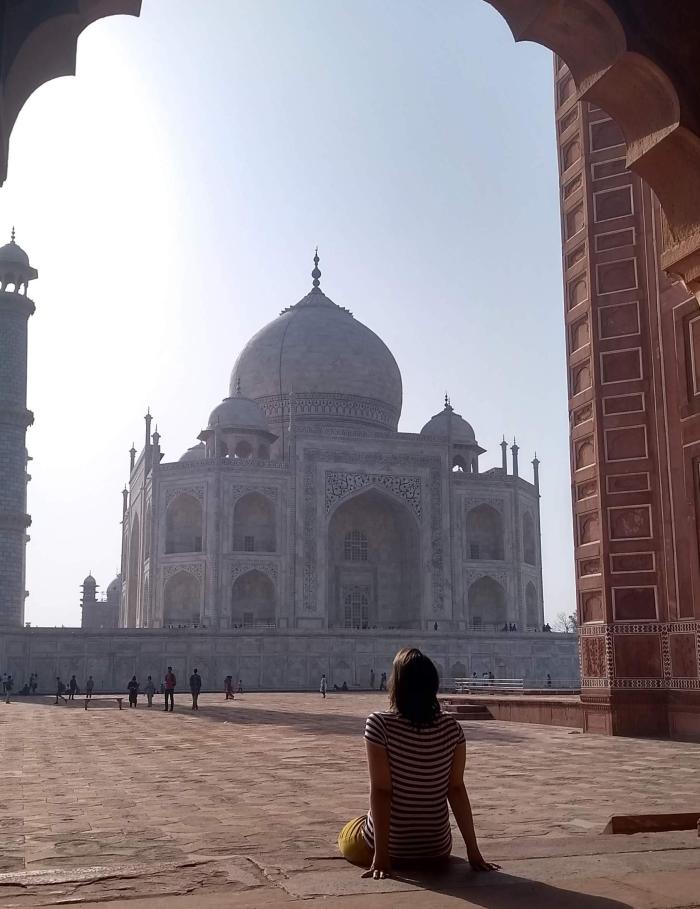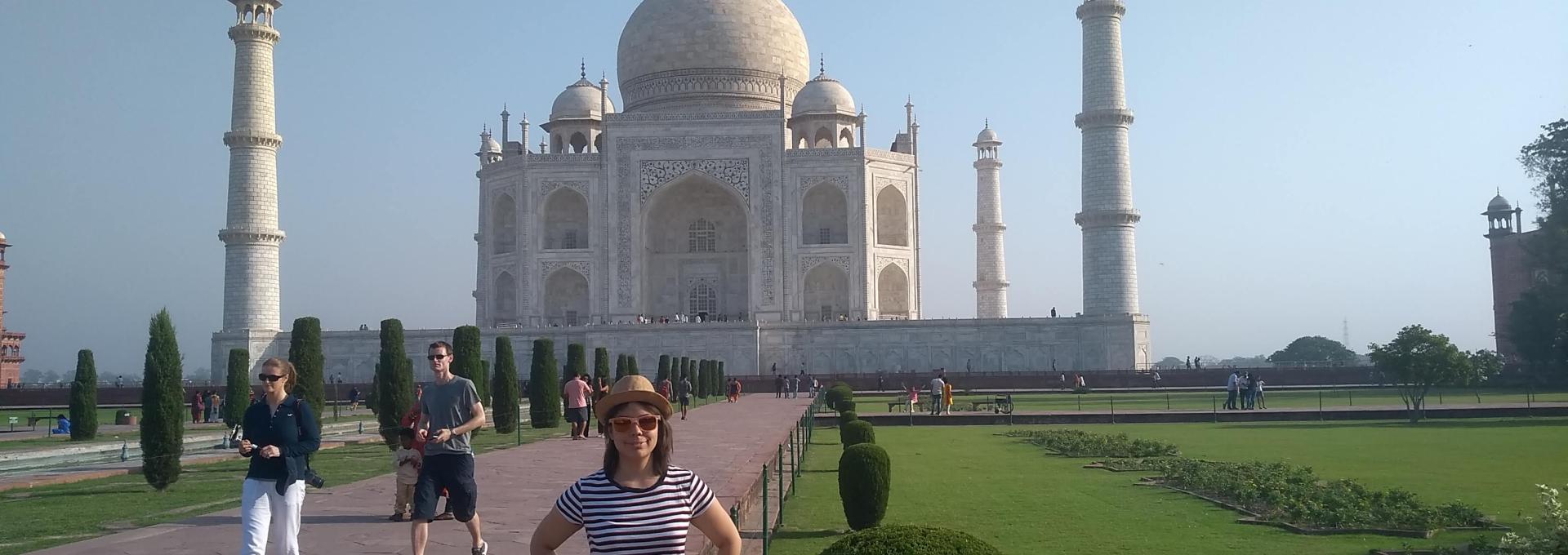
Moira is from Mexico. She did her Bachelor in geophysical engineering at the National Autonomous University of Mexico. She is currently in the 2nd year of the Energy Environment: Science Technology and Management Master’s program. Let’s find out more about the program with her!
Why did you choose to study at École Polytechnique?
Four years ago, I did a summer research internship at École Polytechnique, in one of its labs, analysing the solar data from photovoltaic panels. It was a very good experience. What struck me the most was the commitment of the institution to excellence and the supportive team that gives you any tools and resources that you might need to succeed and achieve whatever you want. They really push you and encourage you to follow any goals you might have.
Doing my internship here, I learned about the Master’s programs open to international students. Once I got my Bachelor diploma, I took a look at all the programs and I was really interested in the Energy Environment one because it had everything I’d always wanted to study during my Bachelor. It was both industry and research oriented..
What are the main benefits of the Energy Environment: Science Technology and Management Master’s program?
One of the most positive aspects of this program is that the academic team gives you all the physical concepts and science knowledge behind the renewable resources that we have nowadays. Moreover, we do not have only scientific courses but also economic and humanities ones. That’s very important because, in general, engineers tend to focus on the science part neglecting the societal problems. Thanks to the well-roundedness of the program, you are then able to propose new solutions, to understand the costs that you can’t include or take out from a project.
The program also gives you a very complete overview and insight of the industry since we have professors who have worked in the field their whole life, in addition to having very strong scientific backgrounds.
Furthermore, we have courses with world-class researchers. It is great to be in contact with very important and skilled people without having to leave the school. And they are always very open and happy to talk with students! So far, I’ve never met a researcher that didn’t have time to talk with me
The School itself offers great opportunities. For example, I’m doing a research internship at the Laboratoire de Météorologie Dynamique of École Polytechnique. And by the end of it, if everyone is satisfied with my work, I’ll have the option to pursue a PhD at Institut Polytechnique Paris which is very exciting. I know that several other students plan to do the same. L’X has also great partnerships with many companies; that’s underrated in my opinion! We really have an advantage because we have direct contact with them.
Finally, the alumni directory is quite vast. It is great to be part of a community and to interact with people from different backgrounds to discuss the possibilities for your professional career, for example.
What do you think of the program structure?
We have mandatory courses which are industry oriented. We also have the option to structure the Master’s program from the 1st year according to our personal interests, by choosing a specialisation. You can indeed choose the type of renewable energies that you want. For example, I chose the solar path. You also have different types of humanities courses such as literature or geopolitics courses in the 2nd year. From a general point of view, the 1st year is more scientific than the 2nd one. In the 1st one, you get all the scientific concepts whereas the 2nd one is more industry oriented because you work a lot on projects.
We also have the Coriolis conferences. L’X or the students’ associations help to bring someone from the professional world to make a presentation. The topics of the conferences are mainly about how the energy market is changing and how we can apply the current technologies to the new needs and demand sof the society.
In addition, we have industry visits. During the 1st year, we went to Grenoble and visited the Centre d’Etudes Nucléaires (CEA), a very important research lab there. We saw the whole process of how they do research on photovoltaic panels for example. We also went to a company where we got to see the whole manufacturing process of photovoltaic panels. We also had other activities such as X Forum throughout our two years that help us to connect with companies.
Could you please tell us more about your promotion, classmates?
We are about 60 students in my promotion, with people from all over the world coming from China, Brazil, Mexico among other countries. Being in such a diverse promotion is an amazing opportunity. You learn from foreign students and they learn from you. It really enriches all your projects as you get different points of views thanks in part to the cultural differences. With regard to the backgrounds of the students, we are all engineers but in very different fields. However, all the students were able to take any courses they wanted to follow regardless their background.
Did you have any favourite subject(s)?
During the 1st year, I was really interested in the courses where we could learn the physics behind the photovoltaic panels and photovoltaic energy in general. I also really enjoyed the Energy Industry Value Chain course because it taught us the whole industry value chain and helped us understand the economic situation. You really can link this knowledge to the scientific concepts and your scientific background. For these reasons, it was one of the favourite courses of my classmates too. For the 2nd year, I particularly liked the atmospheric composition course.
Where did you do your internship last year? What about this year?
I did my 1st year internship in India, at the International Solar Alliance (ISA). I found the offer on the Internet and the recruitment process went so fast. I sent an email on a Sunday, received a reply on Monday morning and by Thursday I had it, which is not how it usually happens! The ISA is a joint project between France and India. It was a great experience because it was not only science oriented but it also related to diplomacy, which was a very nice change. I worked in a program oriented towards solar e-mobility (electric mobility) and solar energy storage. I did a benchmark study of all the policies, technologies and innovation of every country of the ISA. I designed a questionnaire that is actually going to be used by the UN Environment. It is going to be presented as one of their initiatives to see the capacities and needs of each Member country.
This internship was also a good opportunity to develop my office skills as I had to deal with hundreds of mails on a daily basis! I also improved my writing skills as I had to send reports for governments. My supervisor was extremely happy with my work so they sent me to Brazil as a Solar Alliance representative along with another colleague. I got to meet the representatives of many other countries, as well as ambassadors; it was such a great experience.
I’ve started my 2nd year internship at the Laboratoire de Météorologie Dynamique at l’X. I’m mainly working on the data analysis of the photovoltaic system that was installed at the Site Instrumental de Recherche par Télédétection Atmosphérique (SIRTA). The objective is that by the end of my internship we’ll publish an article detailing the instrumentation available at the station and the type of benchmark studies that can be done with the data acquired there.
What would you like to do after your Master’s degree?
I’m planning to do a PhD. Afterwards, I’m not sure I want to keep going on the scientific track and do a postdoc. I’m still open to this possibility but my experience at the International Solar Alliance makes me want to explore other possibilities. One of the main goals of the organisation is to bring solar energy to people who don’t have access to electricity, especially in Africa. The continent has such a huge solar resource but lacks the infrastructure. I’m particularly interested in this project. So, after my PhD, I’m thinking about working in an international organisation.
Moreover, my plan is to stay in France because I really like the culture here. I’d even like to apply for the French citizenship!
